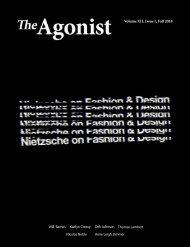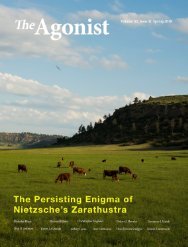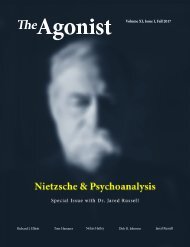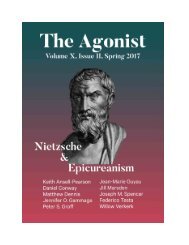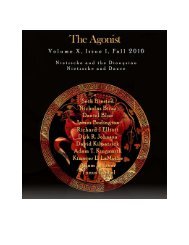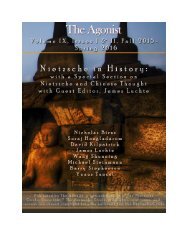Volume XII, Issue II, Spring 2019
You also want an ePaper? Increase the reach of your titles
YUMPU automatically turns print PDFs into web optimized ePapers that Google loves.
THE AGONIST<br />
the flow of time but is formed through an intensifying force. Deleuze echoes<br />
Klossowski’s vertigo but offers an alternative reading: the nausea of the eternal<br />
return is experiencing all possible worlds, but only being able to choose one of<br />
them, that choice being unchangeable, decided for all time. Deleuze’s<br />
interpretation of Nietzsche maintains an allegiance to freedom and fatalism, the<br />
once-and-for-all is the basis of the eternal return, not its disappearance. The<br />
central issue for Deleuze is the mischaracterization of the eternal return as the<br />
return of the same: the eternal return is recurring difference. “Eternal return<br />
cannot mean the return of the Identical because it presupposes a world (that of<br />
the will to power) in which all previous identities have been abolished and<br />
dissolved … Repetition in the eternal return, therefore, consists in conceiving the<br />
same on the basis of the different” (Difference and Repetition 41). The metaphysics<br />
of the will to power undermines the uniformity of a recurring cycle. The eternal<br />
return is the repetition of our metaphysical reality, and our metaphysical reality is<br />
pure chaos. If “[r]eturn is the being of that which becomes” (Nietzsche and Philosophy 24),<br />
chaos and cycle are not in diametric opposition, but chaos, transformation,<br />
ceaseless becoming is naturalized as an eternal law. What we are becoming, we<br />
who are constantly choosing, is a one-of-a-kind endless fluctuation. Deleuze<br />
purports a repetitive present. Individuals have to decide, choosing one option,<br />
among many alternatives, forever.<br />
What unites these two interpretations is their shared contention that<br />
Nietzsche’s concept signifies the existential supposition of multiple life<br />
trajectories simultaneously. The eternal return is the culmination of Nietzsche’s<br />
apocalyptic eschatology, what is to-come is a multiplicity of possible worlds, each<br />
as unthinkable as the next, the eventual survival or extinction of the species each<br />
being one variant amongst an infinite diversity of alternatives. The most<br />
important derivable lesson is ethical: whatever you will, will it in such a way that<br />
you also will its return. The eternal return of never-the-same is a disjointed cycle<br />
of chaotic forces: (1) an initial ascension, (2) pulled back down by gravity, (3)<br />
descending into a dark underworld, (4) precipitating a final ascension into a<br />
qualitatively new and different repetition of the same process. “A thought only rises<br />
by falling, it progresses only by regressing” (Klossowski xvii). Every ascent necessitates<br />
a subsequent descent. Escaping gravity’s rainbow, requires we unchain the earth<br />
from its star, untether humanity from the galaxy. “This ascent will be betrayed to<br />
Gravity… The victim, in bondage to falling, rises on a promise, a prophecy, of<br />
Escape...” (Pynchon 774).<br />
20



